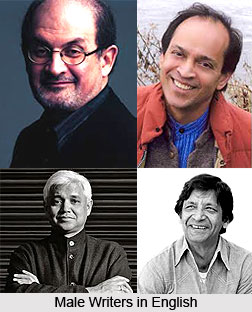Male Writers in English are the ones whose pen refills strictly for the creation of writing in English language and whose native or co-native language could be one of the numerous regional and indigenous languages of India. They have adopted and adapted the colonial tongue and written memorable pieces that have only added to the glitz and glamour of the literature basket.
Male writers in English are the ones who are intimately linked with the works of associates of the Indian Diaspora, especially with people like Salman Rushdie who was born in Indian but presently resides elsewhere. Capturing the innate spirit of independent India belligerent and pugnacious to fracture away from the British and time-honoured Indian cultures and launch a divergent identity has been the part and parcel of writing style of these writers.
 Apart from the venerated writers like Rabindranath Tagore and R.K. Narayan series of other novelists like Kamala Markandaya (Nectar in a Sieve, Some Inner Fury, A Silence of Desire, Two Virgins), Manohar Malgaonkar (Distant Drum, Combat of Shadows, The Princes, A Bend in the Ganges and The Devil`s Wind), Anita Desai (Clear Light of Day, The Accompanist, Fire on the Mountain, Games at Twilight) and Nayantara Sehgal, have ceaselessly captured. Salman Rushdie`s Midnight`s Children invited the global token of timeless fame as accredited him with the titular head of possessing a Booker Prize. Even V.S Naipaul, G.V. Desani, M Ananthanarayanan, Bhadani Bhattacharya, Arun Joshi, Khushwant Singh, O.V. Vijayan, Allan Sealy (The Trotternama), Sashi Tharoor (Show Business, The Great Indian Novel), Amitav Ghosh (Circle of Reason, Shadow Lines) and others made a intricate niche for themselves as they went on adding bricks to the evolutional wall of literary mound.
Apart from the venerated writers like Rabindranath Tagore and R.K. Narayan series of other novelists like Kamala Markandaya (Nectar in a Sieve, Some Inner Fury, A Silence of Desire, Two Virgins), Manohar Malgaonkar (Distant Drum, Combat of Shadows, The Princes, A Bend in the Ganges and The Devil`s Wind), Anita Desai (Clear Light of Day, The Accompanist, Fire on the Mountain, Games at Twilight) and Nayantara Sehgal, have ceaselessly captured. Salman Rushdie`s Midnight`s Children invited the global token of timeless fame as accredited him with the titular head of possessing a Booker Prize. Even V.S Naipaul, G.V. Desani, M Ananthanarayanan, Bhadani Bhattacharya, Arun Joshi, Khushwant Singh, O.V. Vijayan, Allan Sealy (The Trotternama), Sashi Tharoor (Show Business, The Great Indian Novel), Amitav Ghosh (Circle of Reason, Shadow Lines) and others made a intricate niche for themselves as they went on adding bricks to the evolutional wall of literary mound.
Indian English in the mid-20th century witnessed the sudden upsurge and voluminous emergence of poets such as Nissim Ezekiel (The Unfurnished Man), P Lal, A K Ramanujan (The Striders, Relations, Second Sight, Selected Poems), Dom Moraes (A Beginning), Keki .N . Daruwalla, Geive Patel were the direct descendants of the genre of the age of the time that marked the grave deep influential breeze of the Eurocentric literary movements, like Symbolism, Surrealism, Existentialism, Absurdism and Confessional Poetry. These authors heavily had made use of Indian phrases alongside English words and had tried to reproduce a blend of the Indian and the Western cultures.
Male writers in English have had indulged is an honest enterprise to upheld the ever rare writing themes ingrained in writing library. Indian Male Writers have attempted to vouchsafe an identity, de shackling themselves from the thrust identity of the Eurocentric nations. Rather they went on to invite an identity of their own by the means of writing as language is the tool of expression. From being a singular and exceptional, rather gradual native flare-up of geniuses, Male Writers in English has turned out to be a new form of Indian culture and voice in which India converses regularly. While Indian authors - poets, novelists, essayists, dramatists - have been making momentous and considerable contributions to world literature since the pre-Independence era, the past few years have witnessed a gigantic prospering and thriving of Indian English writing in the global market. Not only are the works of Indian authors writing in English surging on the best-seller list, they are also incurring and earning an immense amount of critical acclamation. Commencing from Mulk Raj Anand, R. K. Narayan, Toru Dutt to Salman Rushdie, Vikram Seth, Allan Sealy, Amitav Ghosh, Vikram Chandra - the panache of fine Indian writers is long and much augmented.



















